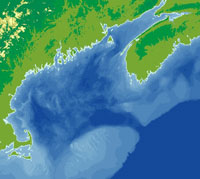Careers

Background: The Importance of Computing
- The Demand for Computing
- Computer Science Careers
- Spatial Informatics Careers
- Information Systems Careers
- New Media Careers
- Demand for Information System Analysts, Designers and Engineers Generally
- Finding Jobs
Background: The Importance of Computing
Bill Gates and Bill Clinton are both devoted to tackling some of the World’s most pressing problems including poverty and health. Both also argue that every child in America and across the globe should learn how to program computers. These statements are related. For our nation’s social and fiscal future to be secure it needs to continue to lead the world in technological innovations. Leading edge innovations depend on an educated workforce with appropriate skills to address challenges such as those related to poverty and health. Programming skills in our children they argue are as important for their digital age future and that of our nation as their math, science, history and language skills. Computational thinking (i.e. critical thinking skills plus the power of computing) is a digital age skill needed by everyone.
Computing plays an important role in virtually all fields, including science and medicine, music and art, business, law, health care, human communication and education; hence computing is inherently interdisciplinary. In a digital world, computing skills are needed in all domains. Sixty-seven percent of software jobs in the US are outside of the technology industry. Industry leaders argue that, in the future and across every domain, students who don’t have an understanding of computing and computer science won’t be able to get good-paying jobs because those jobs just won’t exist. For every job that is “replaced” by a computer, there are several more information technology jobs created. If the Bill’s had their way, foundational computational thinking and practical coding exercises would be embedded throughout the entire K-12 curriculum in a manner similar to the way our school children acquire math, science and language skills. In fact, applying math, English or science in building a computer game or app often drives kids to also learn more math, English and science.
The Demand for Computing
Industry Demand: By 2020, there will be 1.4 million jobs in the computing field in the U.S. but just 400,000 college computer science majors to fill them. Keep in mind that two-thirds of these jobs will be in industries and small businesses other than in information technology including manufacturing, health care, finance, defense and government. The US Bureau of Statistics predicts one in every two STEM jobs in the country will be in computing occupations with more than 150,000 job openings annually. The Bureau of Labor Statistics (BLS) predicts that computer and information technology jobs should anticipate a 13% growth rate through 2026. These jobs pay 75 percent more than the national median annual salary. There is a dire need by industry for computing professionals in Maine. Even a cursory look at job listings on the TechMaine web site indicates that Maine businesses are in constant need of computing and information systems professionals. According to Maine’s Department of Labor, computer occupations are among the occupations in Maine likely to have the fastest net growth and highest percentage of growth in the next decade. In times of high underemployment or unemployment, Maine has had substantial numbers of information technology employers actively looking for information technology professionals. Many are interested in providing paid internships for our university computing and information science students.
Student Demand: In the last year, over ten million young people watched the 5-minute YouTube video on What Most Schools Don’t Teach and close to two million people have watched Lecture 1 of Introduction to Computer Science and Programming offered at MIT. Applications to the undergraduate program in Computer Science at the University of Maine have doubled each year in the past two years. In Computer Engineering, both enrollments and the quality of students enrolled have continued to increase. Maine residents that are (a) place-bound with job and family obligations, (b) have an undergraduate degree in any field, and (c) need enhanced information technology expertise to satisfy employer or personal interest needs are expressing high interest in our UMaine “any time, any place” distance graduate degree programs.
Challenges: In 36 out of 50 states, including Maine, rigorous and engaging computer science courses don’t count towards meeting high school math or science requirements. In most states, including Maine, there are no rigorous standards for computer science high school courses focused on the creation (not just use) of software and other computing technologies and no clear pathways exist for people to become computer science school teachers. Nine out of ten schools don’t offer a single programming course.
Government and Industry Reactions: Legislatures across the nation are active in allowing computer science to count as a mathematics or science elective and are setting rigorous standards for such courses and for teacher certification. NSF is investing heavily in an effort to get 10,000 computer science teachers in 10,000 high schools within a few years. An Hour of Code, supported by industry, is an effort to get 10 million students to spend at least one hour learning computer-programming skills. In Maine, the industry led group of Educate Maine (educatemaine.org) is supporting numerous efforts with middle and high schools to help better prepare Maine’s information technology workforce of tomorrow and is supporting Project>Login (projectlogin.com) to encourage Maine students to take computer science and computer engineering degree programs in college. The project is also working with private companies in Maine to supply students with paid internships in order to incentivize them to stay in computer science and computer engineering degree programs through to graduation.
Computer Science Careers
Computer Science graduates are well-positioned to secure rewarding, high-paying jobs in the computer industry that are relatively immune to outsourcing. In addition, graduates can also apply their knowledge wherever computers are used, including businesses, research institutions, educational institutions, and government laboratories and agencies. The B.S. and B.A. degrees both provide a rigorous emphasis on computer science along with a strong liberal arts education. Consequently, students are well prepared to enter any career that requires a liberal arts degree. Graduates of the Computer Science Department are also well prepared to enter graduate school for further study in computer science or other related fields or, with some additional preparation, to enter a professional school. For further insights, see for instance Reddit. Also see Careers in Computer Science and Careers in Data Science.
Spatial Informatics Careers
From mobile technologies to robotics, GIS, and sensor networks, most information systems are now highly dependent on location and spatial concepts for organizing and tracking information. Graduates of our MS and PhD programs are both self-employed and employed throughout business and government in a broad range of spatial information management and system development positions. Jobs are numerous, varied and well paid. Many past graduates are involved in advancing spatial technology itself; developing software and systems to enhance the ability of individuals, business, government, and industry to better utilize location information, sensors and mobile systems in their daily tasks. Other graduates are involved in more traditional areas of producing digital maps and databases through the application of geospatial technologies and techniques, or managing and developing land information systems. Yet others are involved in managing information about the environment, transportation and other utility systems. Regardless of choice, careers are rewarding and intellectually stimulating. See also the listing of sample Employers of Past Graduates of our UMaine program.
Information Systems Careers
Both industry and government offer a wide variety of positions in information systems practice. As the complexity of modern computer-based systems has increased, there is growing demand for information systems skills. In employment, the capable information systems specialist may be given responsibility for development of systems architecture, system standards, database design and implementation, network design, the overall system development plan, integration, integrated testing, or operational management of information systems. The responsibilities often involve managerial duties, development of proposals, financial planning, and interaction with the client, with correspondingly greater financial rewards than are available in less critical aspects of the work. Breadth of knowledge and ability to communicate well are both especially important, as the information systems professional must deal with specialists as well as non-technical individuals. See also the listing of sample Employers of Past Graduates of our UMaine program. For further insights, see Careers in Data Science.
New Media Careers
New Media graduates may find work in a variety of fields, such as software development, web design, filmmaking, journalism, game design, marketing, and prototyping.
Demand for Information System Analysts, Designers and Engineers Generally
The future business climate in Maine and the rest of the nation will be characterized by rapid technological change, intense global competition, faster product life cycles and more complex, specialized markets. In such an environment the information needs of organizations are increasingly complex and rapidly changing. Individuals with information systems expertise who can design and develop information systems, manage sophisticated information resources, work on interdisciplinary teams and communicate effectively with business managers, engineers and other end-users are in short supply. A major goal of our graduate programs is to produce individuals who can make significant contributions to economic development by ensuring that businesses have the expertise needed to remain competitive.
The demand for graduates of graduate-level information systems programs both in-state and nationally is high. Information technologies are key to enabling the growth of businesses. Individuals in all areas of private and public enterprise rely on information systems for communication, planning, control and decision support. The advanced knowledge provided by graduate-level information systems programs is needed across a wide range of commercial settings. While the market-place demand for students with graduate course work in information systems is already high, the demand for such skills is predicted to steeply increase in the years ahead.
Finding Jobs
Project>Login is a statewide outreach effort to begin meeting the demand for computer professionals in Maine. The vision of Project>Login, a program of Educate Maine, is to generate enough trained professionals to keep Maine businesses at the forefront of their industries. See Project>Login
JobsInME.com‘s mission is to help job seekers find real, local, jobs in Maine and reach their career goals.
The Career Center’s mission is to empower UMaine students to identify and reach their career goals. This mission is a collaborative effort between our staff, students, faculty, employers, and alumni. See UMaine Career Center.

